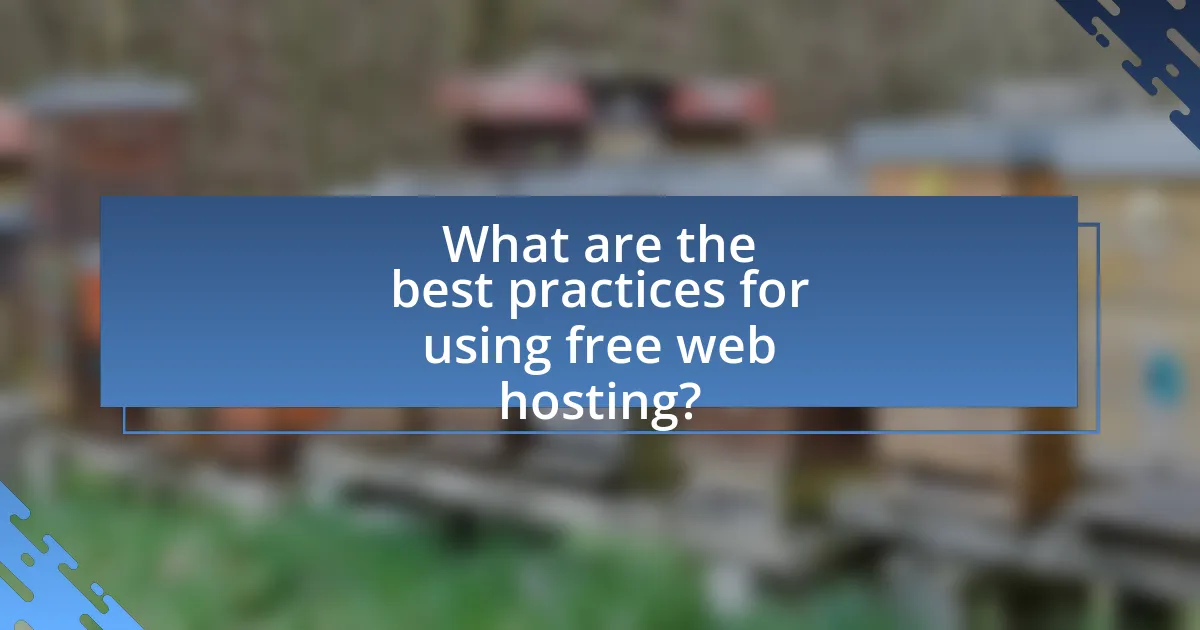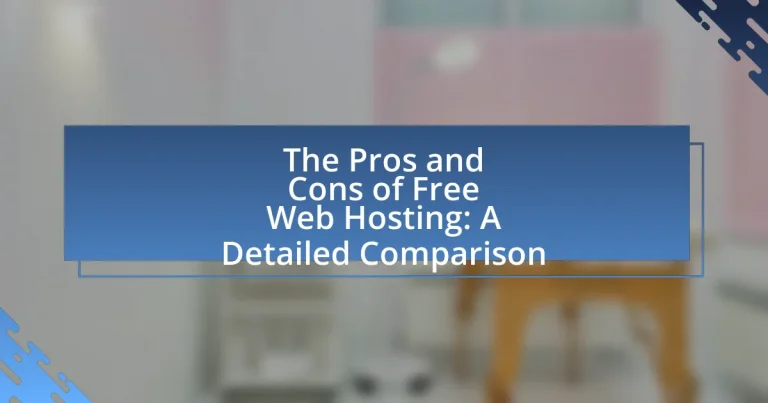The article examines the pros and cons of free web hosting, highlighting its key features, limitations, and how it compares to paid hosting options. It discusses common issues users face, such as restricted storage and bandwidth, lack of customer support, and security risks. Additionally, the article outlines the advantages of free hosting for small businesses and startups, including cost savings and ease of access, while also addressing the potential drawbacks like performance issues and the presence of advertisements. Finally, it provides insights on best practices for maximizing the benefits of free web hosting and when to consider upgrading to paid services.

What are the key features of free web hosting?
Free web hosting typically includes features such as limited storage space, bandwidth restrictions, and the presence of advertisements on hosted sites. These features are designed to provide basic web hosting services at no cost, making it accessible for individuals and small projects. For instance, many free hosting providers offer around 1GB of storage and a bandwidth limit of 5GB per month, which is sufficient for simple websites. Additionally, free web hosting often comes with a subdomain rather than a custom domain, which can affect branding and professionalism.
How does free web hosting differ from paid hosting options?
Free web hosting differs from paid hosting options primarily in terms of features, reliability, and support. Free hosting typically offers limited storage, bandwidth, and functionality, often displaying ads on user sites, while paid hosting provides greater resources, enhanced performance, and customer support. For instance, paid hosting services often guarantee uptime percentages above 99.9%, whereas free hosting may experience frequent downtimes and slower speeds due to shared resources. Additionally, paid options usually include domain registration and advanced security features, which are often absent in free hosting plans.
What limitations are commonly found in free web hosting services?
Free web hosting services commonly have limitations such as restricted bandwidth, limited storage space, lack of customer support, and the presence of advertisements on hosted sites. These restrictions can hinder website performance and user experience. For instance, many free hosting providers impose bandwidth caps that can lead to slow loading times or downtime during high traffic periods. Additionally, storage limits often prevent users from uploading large files or hosting extensive content. The absence of reliable customer support means that users may struggle to resolve technical issues promptly. Furthermore, advertisements placed by the hosting provider can detract from the site’s professionalism and user engagement.
What types of free web hosting services are available?
There are several types of free web hosting services available, including shared hosting, website builders, cloud hosting, and free trials of premium services. Shared hosting allows multiple users to host their websites on a single server, which is cost-effective but may lead to slower performance due to resource sharing. Website builders, such as Wix or Weebly, provide user-friendly interfaces for creating websites without coding, often with limited customization options. Cloud hosting offers scalable resources and is typically more reliable, though free versions may have restrictions. Free trials of premium services allow users to experience full features for a limited time, providing insight into the benefits of paid hosting. Each type serves different needs, making it essential for users to choose based on their specific requirements.
What are the advantages of using free web hosting?
The advantages of using free web hosting include cost savings, ease of access, and basic features suitable for small projects. Cost savings are significant as users do not incur any financial expenses, making it ideal for individuals or startups with limited budgets. Ease of access allows users to quickly set up a website without technical expertise, as many free hosting services offer user-friendly interfaces and templates. Basic features typically include limited storage, bandwidth, and support, which can be sufficient for personal blogs or small business sites. These advantages make free web hosting an attractive option for those starting out or testing ideas without financial commitment.
How can free web hosting benefit small businesses and startups?
Free web hosting can significantly benefit small businesses and startups by providing a cost-effective solution for establishing an online presence. This allows these entities to allocate their limited financial resources to other critical areas such as marketing and product development. According to a survey by Clutch, 30% of small businesses reported that cost is the primary factor in choosing a web hosting service. Additionally, free web hosting platforms often come with user-friendly tools that simplify website creation and management, enabling entrepreneurs to focus on their core business activities without needing extensive technical knowledge.
What cost savings can be achieved with free web hosting?
Free web hosting can achieve significant cost savings by eliminating monthly or annual fees typically associated with paid hosting services. Users can save anywhere from $5 to $500 per year, depending on the hosting plan they would have chosen. This financial relief allows individuals and small businesses to allocate resources to other areas, such as marketing or product development. Additionally, free web hosting often includes basic features like website builders and templates, which further reduces the need for additional expenditures on design and development services.
What are the disadvantages of free web hosting?
Free web hosting has several disadvantages, including limited storage and bandwidth, which can hinder website performance. Users often face restrictions on features and functionalities, such as the inability to use custom domains or access advanced tools. Additionally, free hosting services frequently display ads on users’ websites, detracting from the user experience and brand image. Security is another concern, as free hosting providers may lack robust security measures, making websites more vulnerable to attacks. Furthermore, customer support is typically minimal or non-existent, leaving users without assistance when issues arise. These limitations can significantly impact the effectiveness and professionalism of a website.
How does the lack of customer support impact users of free web hosting?
The lack of customer support significantly impacts users of free web hosting by leaving them without assistance during technical issues or service outages. Users often face prolonged downtime, unresolved technical problems, and frustration due to the absence of timely help, which can lead to loss of website traffic and potential revenue. According to a survey by HostingAdvice, 70% of users reported that inadequate support was a major drawback of free hosting services, highlighting the critical role that customer support plays in user satisfaction and operational stability.
What security risks are associated with free web hosting services?
Free web hosting services pose several security risks, including data breaches, malware infections, and lack of support for security updates. These services often have inadequate security measures, making them vulnerable to attacks. For instance, a study by the University of California found that 60% of free hosting providers do not implement basic security protocols, increasing the likelihood of unauthorized access to user data. Additionally, free hosting platforms may share server resources among multiple users, which can lead to cross-site scripting (XSS) vulnerabilities. The absence of regular backups and limited customer support further exacerbates these risks, leaving users exposed to potential data loss and exploitation.

How do user experiences vary with free web hosting?
User experiences with free web hosting vary significantly based on factors such as service reliability, customer support, and available features. Users often report slower website loading times and limited bandwidth, which can lead to frustration, especially for those running business sites. Additionally, many free hosting services impose restrictions on storage space and may display intrusive advertisements, detracting from the user experience. A study by HostingAdvice found that 70% of users experienced downtime with free hosting services, highlighting reliability issues. Furthermore, the lack of customer support can leave users feeling unsupported when technical problems arise, as many free services do not offer comprehensive assistance. Overall, while free web hosting can be appealing for personal projects or testing, the variability in user experiences often leads to dissatisfaction for those seeking professional-grade performance.
What common issues do users face with free web hosting?
Users commonly face several issues with free web hosting, including limited storage and bandwidth, lack of customer support, and frequent downtime. Limited storage and bandwidth restrict the amount of data and traffic a website can handle, often leading to performance issues. A study by HostingAdvice found that 70% of users experienced slow loading times due to these limitations. Additionally, free hosting services typically offer minimal or no customer support, leaving users without assistance during critical issues. Furthermore, free web hosting often results in frequent downtime, which can negatively impact website accessibility and user experience, as reported by a survey from Website Planet indicating that 60% of free hosting users experienced downtime.
How do uptime and reliability compare in free versus paid hosting?
Uptime and reliability in free hosting are generally lower compared to paid hosting. Free hosting services often have limited resources, resulting in frequent downtimes and slower response times, with uptime rates averaging around 80-90%. In contrast, paid hosting typically offers guaranteed uptime of 99.9% or higher, backed by service level agreements (SLAs) and better infrastructure. For example, a study by HostingFacts found that paid hosting providers like Bluehost and SiteGround consistently deliver higher uptime percentages, often exceeding 99.95%, due to their investment in robust server technology and customer support.
What are user reviews saying about popular free web hosting providers?
User reviews indicate that popular free web hosting providers often receive mixed feedback. Many users appreciate the cost-effectiveness and ease of use, highlighting platforms like InfinityFree and 000webhost for their user-friendly interfaces and no-cost services. However, reviews frequently mention limitations such as restricted bandwidth, lack of customer support, and frequent downtime, particularly with providers like Freehostia and AwardSpace. Users also express frustration over the presence of ads on their sites, which detracts from the overall experience. Overall, while free web hosting can be appealing for beginners or small projects, user reviews suggest that the trade-offs in performance and support are significant concerns.
What factors should be considered when choosing free web hosting?
When choosing free web hosting, factors such as storage space, bandwidth, uptime reliability, customer support, and advertising policies should be considered. Storage space determines how much data can be hosted, while bandwidth affects the amount of traffic the site can handle. Uptime reliability is crucial for ensuring the website is accessible, with a standard uptime of 99.9% being ideal. Customer support availability can impact troubleshooting and site management, and advertising policies may dictate whether the host places ads on your site, which can affect user experience. Each of these factors plays a significant role in the overall effectiveness and usability of the free web hosting service.
How important is scalability in free web hosting options?
Scalability is crucial in free web hosting options because it determines the ability to accommodate growth in website traffic and resource demands. Many free hosting services impose strict limitations on bandwidth, storage, and performance, which can hinder a website’s ability to scale effectively. For instance, a study by HostingAdvice found that 70% of users experienced performance issues due to these limitations, impacting their site’s reliability and user experience. Therefore, without adequate scalability, free web hosting can restrict a website’s potential for growth and success.
What features should users prioritize in free web hosting services?
Users should prioritize reliability, storage space, bandwidth, customer support, and ease of use in free web hosting services. Reliability ensures that the website remains accessible, with uptime rates ideally above 99.9%. Adequate storage space allows users to host their content without frequent limitations, while sufficient bandwidth accommodates traffic without slowdowns. Customer support is crucial for resolving issues quickly, and ease of use simplifies the setup and management process for users with varying technical skills. These features collectively enhance the user experience and website performance in free web hosting environments.

What are the best practices for using free web hosting?
The best practices for using free web hosting include selecting a reputable provider, understanding the limitations of the service, and regularly backing up your data. Choosing a reputable provider ensures reliability and minimizes downtime, as many free hosts may have poor performance or security issues. Understanding limitations, such as bandwidth caps and storage restrictions, helps in managing expectations and planning for potential upgrades. Regularly backing up data is crucial because free hosting services may not offer robust data recovery options, making it essential to safeguard your content against loss.
How can users maximize the benefits of free web hosting?
Users can maximize the benefits of free web hosting by selecting a provider that offers essential features such as adequate storage, bandwidth, and customer support. Choosing a reputable free web hosting service, like WordPress.com or Wix, ensures access to user-friendly interfaces and essential tools for website creation. Additionally, users should leverage the available templates and customization options to enhance their site’s appearance and functionality. Utilizing community forums and support resources provided by the hosting service can also help users troubleshoot issues and optimize their website performance. According to a 2021 survey by HostingAdvice, 70% of users reported improved website performance when utilizing the support resources offered by their hosting provider.
What strategies can help mitigate the limitations of free web hosting?
To mitigate the limitations of free web hosting, users can employ strategies such as upgrading to a paid plan, utilizing content delivery networks (CDNs), and optimizing website performance. Upgrading to a paid plan often provides enhanced features, increased storage, and better customer support, addressing common issues like bandwidth limitations and lack of technical assistance. Implementing CDNs can improve loading times and reduce server strain by distributing content across multiple servers globally, which is crucial for maintaining user experience. Additionally, optimizing website performance through techniques like image compression and minimizing code can help ensure that the site runs efficiently even within the constraints of free hosting services. These strategies collectively enhance the functionality and reliability of websites hosted on free platforms.
How can users ensure their website remains secure on free hosting?
Users can ensure their website remains secure on free hosting by implementing strong passwords, regularly updating software, and utilizing HTTPS. Strong passwords reduce the risk of unauthorized access, while keeping software updated protects against vulnerabilities. Utilizing HTTPS encrypts data transmitted between the user and the website, enhancing security. According to a 2021 study by the Cybersecurity & Infrastructure Security Agency, 80% of data breaches are linked to weak or stolen passwords, highlighting the importance of password strength. Regular updates are crucial, as 60% of breaches exploit known vulnerabilities that could have been patched.
What are the alternatives to free web hosting?
The alternatives to free web hosting include paid web hosting services, cloud hosting, and virtual private servers (VPS). Paid web hosting services, such as Bluehost and SiteGround, offer enhanced features like customer support, increased storage, and better security compared to free options. Cloud hosting, provided by companies like Amazon Web Services and Google Cloud, allows for scalable resources and high availability, making it suitable for growing websites. VPS hosting, offered by providers like DigitalOcean and Linode, gives users dedicated resources on a virtual server, combining affordability with greater control and performance. These alternatives provide more reliability and functionality, addressing common limitations associated with free web hosting.
When should users consider upgrading to paid hosting services?
Users should consider upgrading to paid hosting services when they require enhanced performance, reliability, and support that free hosting cannot provide. Free hosting often comes with limitations such as slower loading speeds, restricted bandwidth, and lack of customer service, which can negatively impact user experience and website functionality. For instance, a study by HostingAdvice found that websites on paid hosting plans load 50% faster on average compared to those on free plans, leading to better user retention and SEO rankings. Additionally, paid hosting typically offers more storage, advanced security features, and the ability to use a custom domain, which are essential for businesses and serious projects.
What are the benefits of using low-cost hosting options instead of free hosting?
Low-cost hosting options provide enhanced reliability, better customer support, and increased performance compared to free hosting. Unlike free hosting, which often suffers from downtime and limited resources, low-cost hosting typically guarantees uptime and offers dedicated server resources, ensuring that websites run smoothly. Additionally, low-cost hosting services often include customer support, which is crucial for resolving technical issues quickly, while free hosting may lack adequate support. Furthermore, low-cost hosting allows for greater customization and control over the website, enabling users to implement specific features and optimizations that are often restricted in free hosting environments.
What tips can help users troubleshoot common issues with free web hosting?
To troubleshoot common issues with free web hosting, users should first check their internet connection to ensure it is stable and functioning properly. A reliable connection is essential for accessing hosted websites. Next, users should verify their domain settings, ensuring that DNS records are correctly configured to point to the hosting server. Additionally, users should review any error messages displayed, as these can provide specific clues about the underlying issue. For instance, a “403 Forbidden” error indicates permission issues, while a “404 Not Found” error suggests that the requested page does not exist. Users can also consult the hosting provider’s support documentation or community forums for guidance on resolving specific problems. Regularly clearing browser cache can help eliminate issues related to outdated files. Finally, if problems persist, users should consider reaching out to customer support for personalized assistance, as many free hosting services offer limited support options.

